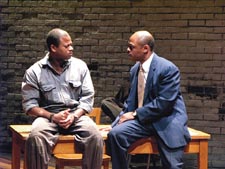Tough Lessons
Round House falters somewhat in its staging of a revered novel, while Arena finds that mother always knows best
by Tom Avila
September 26, 2007
When Ernest J. Gaines’ novel A Lesson Before Dying was published in 1993 it found fast fame. Nominated for a Pulitzer Prize, awarded a National Book Critic’s Circle Award and, perhaps more important than any other modern literary accolade, named a book club pick by Oprah Winfrey, Lesson achieved the stature of instant classic.
This creates an interesting dilemma for those wanting to translate it from the page to the stage. How does one take a work of such pedigree, whose writer has been honored by the MacArthur Foundation, and make it one’s own? Should it be handled gently, its contents guarded like a case of fragile eggs or should it be dangled fearlessly over the edge, as courageously and boldly as it was first written?
 Dignity denied: Taylor and Rogers. (Photo by Danisha Crosby) |
With Round House Theatre’s production of award-winning playwright Romulus Linney’s adaptation, that decision is never fully made. While it is clear that much of the heart of Gaines’ novel has been carefully protected, creative decisions distract rather than contribute. The end result is largely uneven.
Set in 1940s Louisiana, Lesson tells the story of two men: Grant Wiggins (KenYatta Rogers), a teacher desperate to escape life in Bayonne, and Jefferson (Shane Taylor), an innocent man awaiting his execution. Grant is brought into Jefferson’s life by Emma Glenn (Beverly A. Cosham) who is determined to see that the young man she raised is allowed some dignity in his final moments, a dignity too often denied the black men and women of the community.
It’s an undeniably powerful piece of theater and when it works, it is brilliant. However, there are too many times when Round House’s production doesn’t work and a play that has great promise is obscured by poor decisions. Music comes in and takes the place of honest emotion, staging decisions seem odd and distracting and parts of the scenic design (specifically a looming portrait of Jefferson that mysteriously peeks through the set) seem completely unconnected to the work on the stage. It’s as though the members of the creative and production teams were all coming at Lesson from completely unrelated directions.
This lack of connection carries over to the cast as well. There is a kind of hollowness to the performances. In place of rising tension, emotion comes at the audience either white hot or ice cold. Because of this, the audience is denied the chance to build the relationship we need to truly feel what is at stake.
A LESSON BEFORE DYING   To Oct. 14 $10-$60 www.roundhousetheatre.org |
A notable exception to this is Rachel Leslie as Vivian Baptiste. There’s an elegance and strength to Leslie’s work that allows her to bring to life one of the show’s most breathtaking moments. It is simple and lovely and deserving of ovations.
There is so much obvious potential on the stage at Round House with this production of A Lesson Before Dying. Unfortunately, what we are not seeing is a willingness to commit to a singular vision, and that does not serve the playwright’s work or the faith of the audience. It is a lesson to be learned.
On some level, the families of writers live with the constant fear that they will find their mannerisms, eccentricities — their very lives — writ out in black and white. What we hear less about, and this is probably because this feedback would come from those family members who are not offered a few thousand words in Vanity Fair, are those times when the writer has tidied up those lives, simplifying them for the sake of artistic structure and creative vision.
”That’s not how it happened. Mom smoked on the back porch.” Or, ”That wasn’t Uncle Sal who brought the smoked fish to Christmas. I don’t think Sal was even there that year.”
As readers, we happily go along with what the writer has selected to show us. After all, we’re reading (or watching, in the case of a playwright’s work) for new ideas and insights. We’re looking for writing, not reminiscing.
So what would possess a writer to invite her mother to sit on the sidelines of her very autobiographical performance? Or, as playwright Lisa Kron consistently reminds us, what would possess a writer to invite her mother to sit on the sidelines of ”a multicultural theatrical exploration of issues of health and illness both in the individual and in a community”? This is not, Kron tells us, about her and her mother. She’s seeking to share a universal truth. And sometimes that journey means events must be condensed, re-ordered and, yes, re-cast.
To that end — and this is where things get a little confusing — for Arena Stage’s production of Well, the playwright Lisa Kron, who really wrote the play and originated the role of Lisa Kron in all senses, is played by Emily Ackerman. Ackerman is funny and smart and causes one to wonder, even ever so slightly, if the real Lisa Kron would like to perhaps be just like the actor playing Lisa Kron as she plays Lisa Kron. Confused? No? Well, give it a minute.
Mixing elements of her own story as a patient in an allergy unit, her mother’s work for racial integration in their neighborhood in East Lansing, Mich. and, later, her mother’s chronic fatigue and bouts of illness, Kron brings something unique and wonderful to Arena’s Fichandler Stage.
WELL    To Oct. 14 $52-$66 www.arenastage.org |
Well is incredibly difficult to categorize. It’s a one-woman show, with the one woman played by another woman, which actually has six people in it. It’s a play that is actually the rehearsal of a play or, rather, a theatrical exploration. Our narrator is constantly foiled by her mother (Nancy Robinette), who literally sits on the edges of the performance, offering the audience — and actors — cold drinks and correcting Kron’s memory about how certain incidents actually occurred.
The play does fall into some of the usual traps that one sees with autobiographical works. There are points where it feels as though we are wandering a bit into territory that is slightly self-indulgent, where the cleverness of the show begins to feel gimmicky. But those difficulties are easy to forgive in light of Kron’s well-paced and brilliantly written play.
The Plush ‘Age of Innocence’ Overstays its Welcome
Arena Stage's "The Age of Innocence" burns so slowly that the production's dramatic flame nearly fizzles out.
By André Hereford on March 22, 2025 @here4andre
Beautiful gowns and vibrant performances bring glamorous life to Arena Stage's plush Gilded Age drama The Age of Innocence. But the pleasures of those finer qualities fade over the course of a stiffly-paced production that takes too long to get where it needs to go.
Hana S. Sharif stages the play on the voluminous in-the-round Fichandler Stage with minimal scenery -- all the better for focusing attention on the fraught interactions and slight but meaningful gestures that drive Edith Wharton's Pulitzer-winning novel, adapted for the stage by renowned D.C. playwright Karen Zacarías.
Holly Twyford and Kate Eastwood Norris Shine in ‘Bad Books’
A provocative library book sparks a town-wide culture war in Round House's blazing and timely world premiere, "Bad Books."
By André Hereford on April 19, 2025 @here4andre
A concerned mom in Sharyn Rothstein's Bad Books raises a hell of a ruckus over a library book she deems obscene, but, in truth, neither her ensuing crusade nor Rothstein's juicily enjoyable play are about bad books, whatever those might be.
The book in question -- bearing an amusingly suggestive title which won't be spoiled here -- seems only incidental to what's really upsetting this Mother.
Still, that won't stop her from raising a self-righteous army of fellow concerned moms in her campaign to have the supposedly offensive tome removed from the shelves of her town's public library.
Support Metro Weekly’s Journalism
These are challenging times for news organizations. And yet it’s crucial we stay active and provide vital resources and information to both our local readers and the world. So won’t you please take a moment and consider supporting Metro Weekly with a membership? For as little as $5 a month, you can help ensure Metro Weekly magazine and MetroWeekly.com remain free, viable resources as we provide the best, most diverse, culturally-resonant LGBTQ coverage in both the D.C. region and around the world. Memberships come with exclusive perks and discounts, your own personal digital delivery of each week’s magazine (and an archive), access to our Member's Lounge when it launches this fall, and exclusive members-only items like Metro Weekly Membership Mugs and Tote Bags! Check out all our membership levels here and please join us today!
The Magazine
-
Most Popular
 Youngkin Demands Gay Candidate Exit Race Over Nude Photos
Youngkin Demands Gay Candidate Exit Race Over Nude Photos  More Stars Added to WorldPride 2025 Saturday Concert
More Stars Added to WorldPride 2025 Saturday Concert  Gallery: Blake Little's Breathtaking 'Construction Nudes'
Gallery: Blake Little's Breathtaking 'Construction Nudes'  Jiggly Caliente, a 'Drag Race' Fan Favorite, Dead at 44
Jiggly Caliente, a 'Drag Race' Fan Favorite, Dead at 44  Win Tickets to Grace Jones & Janelle Monáe at The Anthem
Win Tickets to Grace Jones & Janelle Monáe at The Anthem  Feds Launch “Snitch Line” Targeting Trans Healthcare
Feds Launch “Snitch Line” Targeting Trans Healthcare  A Fabulously Funny, Powerfully Felt 'Hedwig'
A Fabulously Funny, Powerfully Felt 'Hedwig'  "Senate Twink" Says Video Sex Scandal Drove Him to Flee U.S.
"Senate Twink" Says Video Sex Scandal Drove Him to Flee U.S.  Gay Man is GOP Nominee in Virginia's Lt. Governor Race
Gay Man is GOP Nominee in Virginia's Lt. Governor Race  Trump Administration Puts LGBTQ Teens at Greater Suicide Risk
Trump Administration Puts LGBTQ Teens at Greater Suicide Risk
 Trump Administration Puts LGBTQ Teens at Greater Suicide Risk
Trump Administration Puts LGBTQ Teens at Greater Suicide Risk  Jiggly Caliente, a 'Drag Race' Fan Favorite, Dead at 44
Jiggly Caliente, a 'Drag Race' Fan Favorite, Dead at 44  More Stars Added to WorldPride 2025 Saturday Concert
More Stars Added to WorldPride 2025 Saturday Concert  Win Tickets to Grace Jones & Janelle Monáe at The Anthem
Win Tickets to Grace Jones & Janelle Monáe at The Anthem  Dairan Fernández de la Fuente’s Bold and Vibrant Tribute to Cuba
Dairan Fernández de la Fuente’s Bold and Vibrant Tribute to Cuba  'Smash' is Broadway's Gift to Theatergoers Everywhere
'Smash' is Broadway's Gift to Theatergoers Everywhere  A Fabulously Funny, Powerfully Felt 'Hedwig'
A Fabulously Funny, Powerfully Felt 'Hedwig'  Youngkin Demands Gay Candidate Exit Race Over Nude Photos
Youngkin Demands Gay Candidate Exit Race Over Nude Photos  'Egghead & Twinkie' Is A Colorful Queer Road Trip
'Egghead & Twinkie' Is A Colorful Queer Road Trip  Cronenberg's 'The Shrouds' Turns Mourning Into Morbid Spectacle
Cronenberg's 'The Shrouds' Turns Mourning Into Morbid Spectacle
Scene
Metro Weekly
Washington's LGBTQ Magazine
P.O. Box 11559
Washington, DC 20008 (202) 638-6830
About Us pageFollow Us:
· Facebook
· Twitter
· Flipboard
· YouTube
· Instagram
· RSS News | RSS SceneArchives
Copyright ©2024 Jansi LLC.








